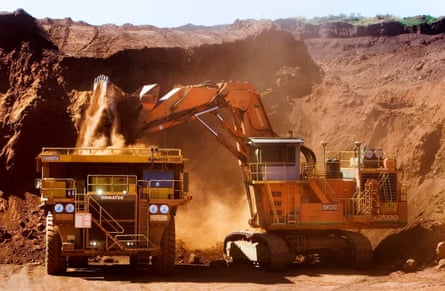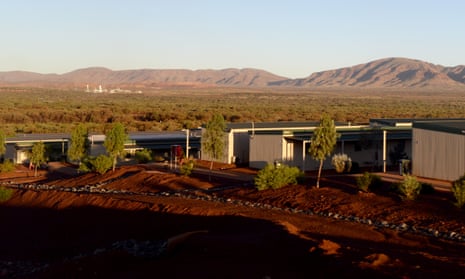In the remote Australian outback, multinational companies are embarking on a secretive new kind of mining expedition.
Rio Tinto has long mined the Pilbara region of Western Australia for iron ore riches but now the company is seeking to extract a rather different kind of resource – its own employees, for data.
Thousands of Rio Tinto personnel live in company-run mining camps, spending not just work hours but leisure and home time in space controlled by their employer – which in this emerging era of smart infrastructure presents the opportunity to hoover up every detail of their lives.

Rio Tinto is no stranger to using technology to improve efficiency, having replaced human-operated vehicles with automated haul trucks and trains controlled out of a central operations centre in Perth.
The company is embarking on an attempt to manage its remaining human workers in the same way, and privacy advocates fear it could set a precedent that extends well beyond the mining industry.
Rio Tinto announced in March that Sodexo, a French company that also runs Australian prisons, had been enlisted in a 10-year facilities management contract encompassing three ports, six towns, three aerodromes, 15 operational sites, 42 accommodation sites, 134 town assets, 336 commercial buildings and 3,259 residential properties.
Sodexo approached the Guardian about publishing an article by the project’s manager Keith Weston, vice-president for mining global sales and business development, who detailed how as part of that contract the company is in the process of dramatically expanding surveillance of Rio Tinto’s Pilbara assets via a platform that live streams information to a monitoring station in Perth staffed by 50 people.
“It gives us actionable, real-time insights and metrics on equipment and people movement, customer satisfaction, even retail spending,” Weston wrote. “Our goal is to get to the point where we can capture individual insights on where employees are spending their time and money and improve the quality of their lives.
“Over time, Sodexo plans to add sensors to light poles and rubbish bins, and we already have plans to start experimenting with drones.”
Already implemented are GPS tracking logs of vehicle movements, and smart water systems that notify operators about declining water supplies or pipes degrading to the point where they will need repair.
The smart infrastructure will also alert Sodexo to extreme weather events, allowing the company to prepare in advance for the cyclones that regularly wreak havoc upon the Pilbara coastline.
When the Guardian suggested instead a standalone story about the plans and sent through some questions, a PR firm representing Sodexo initially welcomed the proposal but then changed tack, making the first of several requests that the investigation be abandoned on the basis it was too early to report on many of the in-development innovations.
Velrada, the data company responsible for building the platform used by Rio Tinto to remotely track trains, autonomous trucks and drill positions, was at first willing to discuss its role in providing similar capability to the Sodexo contract but withdrew from the scheduled interview at the last minute, citing pressure from Sodexo. Rio Tinto did not respond to requests for comment before publication.
After publication of this article on Thursday, a Sodexo spokesperson said: “Sodexo would like to clarify that there is no use of drones at any of the Rio Tinto sites in the Pilbara, and that all data collected is in line with both Australian government legislation and Rio Tinto privacy policies.
“The comments in regards to future technology [are] conceptual only and there are no intentions to introduce any of these concepts to Rio Tinto sites.”
Sources within the corporation’s workforce say workers have not been informed or approached for consent to most of the initiatives detailed in Weston’s article, and expressed concern that the measures were paving the way for further automation of the workforce.
Speaking to the Guardian on condition of anonymity, a Rio Tinto employee said the data gathering would distract workers. “It will lead to unwanted psychological stress which will lead to extra pressure and loss of focus on the job,” he said.
“How focused can you be knowing there’s drones or cameras constantly watching you everywhere you go? We are exposed to a dangerous job, let’s not forget it.”

In July the Western Mine Workers’ Alliance raised concerns about new surveillance measures at Western Turner iron ore mine in the Pilbara, where workers noticed CCTV cameras had been installed.
The union claimed employees only realised they were being watched after hearing supervisors comment about their new ability to “zoom right in” on workers.
“This was a concern on many levels not least privacy, anyone who has worked in a remote area of a mine site knows that toilet facilities are few and far between,” the union noted.
Sodexo says smart waste disposal units would enable their central operating team to be alerted when bins need emptying. But civil liberty advocates have raised concerns that smart bins are capable of monitoring not just the quantity of rubbish, but what exactly is being thrown away.
Sue Crock, the coordinator of the mining sector mental health service This Fifo Life, expressed concern about the impact of expanding the potential for surveillance at a time when mass layoffs have Rio Tinto employees fearing for their jobs. Last month up to 500 more redundancies were confirmed, bringing the total number over two years to 2,000.
She said the mental health impact would vary from worker to worker. “For our wellbeing it is important we feel we have autonomy over our lives, decisions we make and how we live,” she said.
“Being monitored can decrease this sense of autonomy and control. Some people like the sense of security it gives them by having clear rules and monitoring. For others it can feel invasive and an infringement of their rights.”
David Vaile, vice-chair of the Australian Privacy Foundation, said the scale of the planned smart infrastructure meant it could be used for all sorts of purposes, including cracking down on union activity, finding out if employees were visiting sex workers, pinpointing the source of leaks (of the whistleblower variety, not the water kind), and helping law enforcement with criminal investigations.
“I’m not saying they would do any of that and obviously there are lots of potential benefits for workers and the company, the question is whether the data is safe,” he says.
“Sodexo and Rio Tinto are sort of custodians in this – there could be a lot of personal data in there. Protecting it becomes difficult, and exploiting it becomes tempting. If they want to appear trustworthy, they would want to undertake some sort of open privacy impact assessment. Once you break someone’s confidentiality, you can’t go back and fix it.”
Vaile said Australia’s privacy laws were particularly weak in relation to employee records and a proposed mandatory data breach notification law under consideration by the Australian parliament contains too many loopholes to be of use to any Rio Tinto workers unhappy with the level of intrusion into their lives.
He worries that the rollout of smart infrastructure in privately run communities could take hold across Australia.
“You might find councils and public entities that would not have initiated this kind of thing – as they have greater obligation to act in open ways, to respect civic virtues – they might look at it after and say, ‘Well it worked up there at Sodexo’s place, why can’t we do it, or pay them to do it for us?’”

Comments (…)
Sign in or create your Guardian account to join the discussion